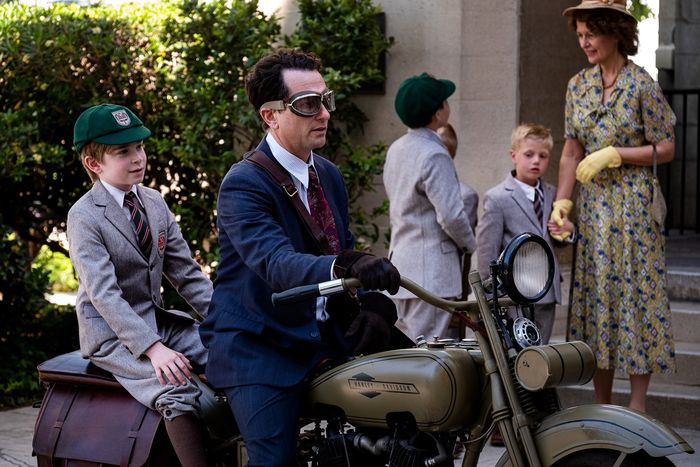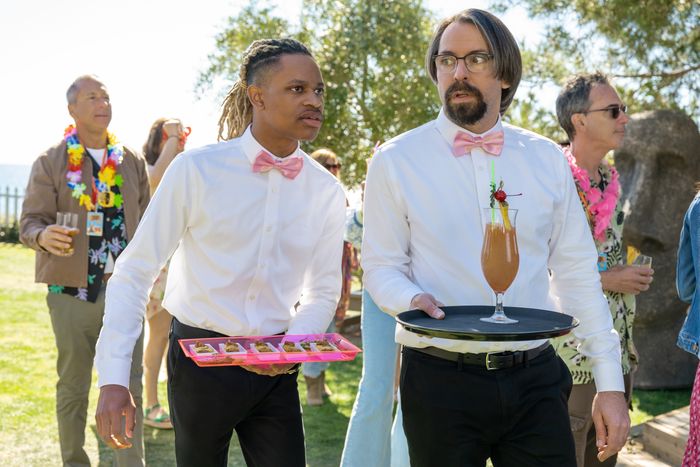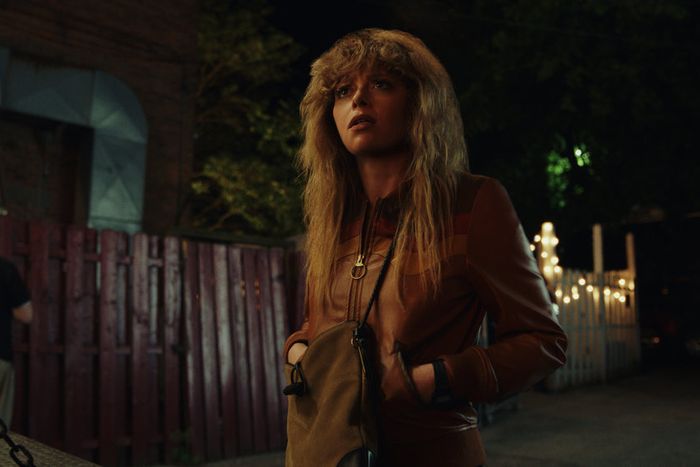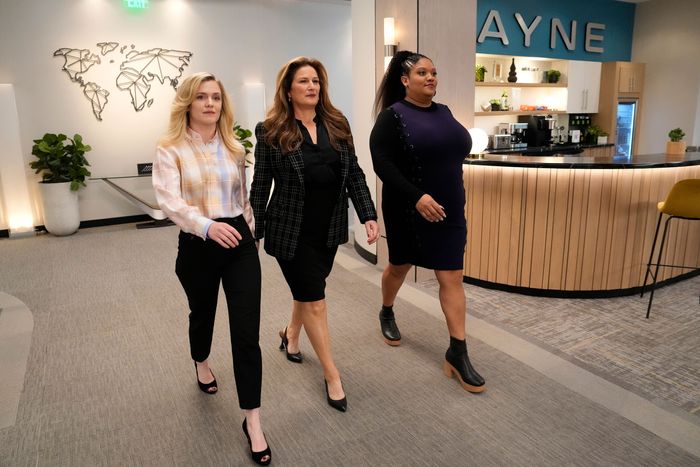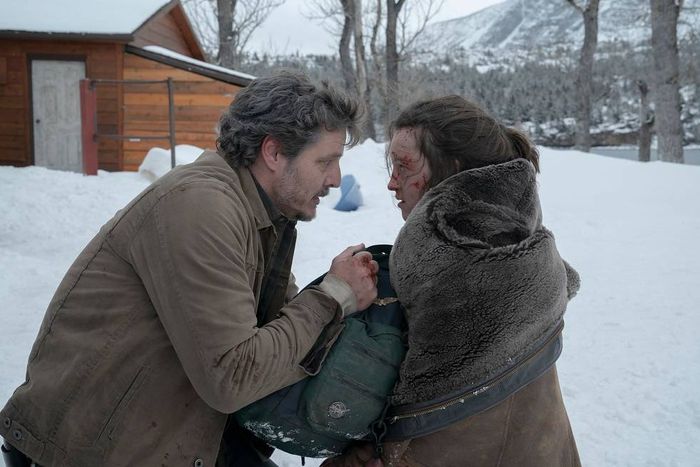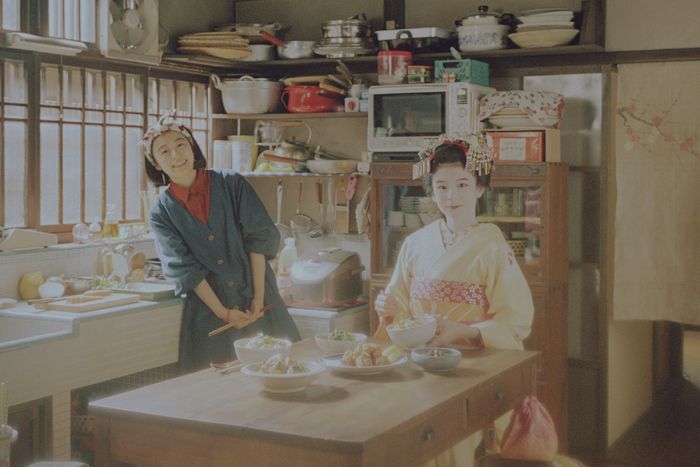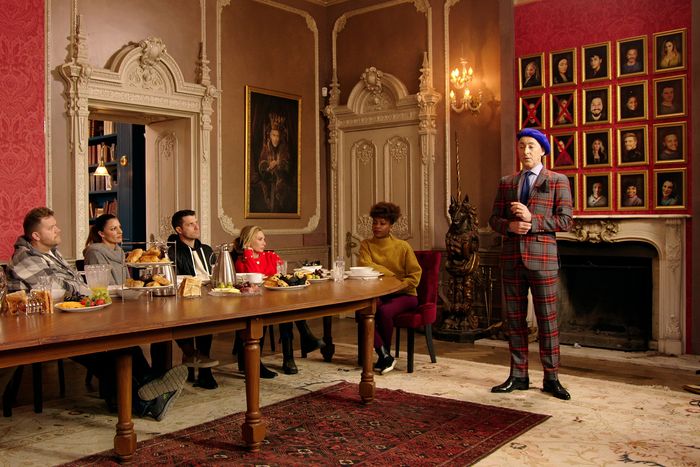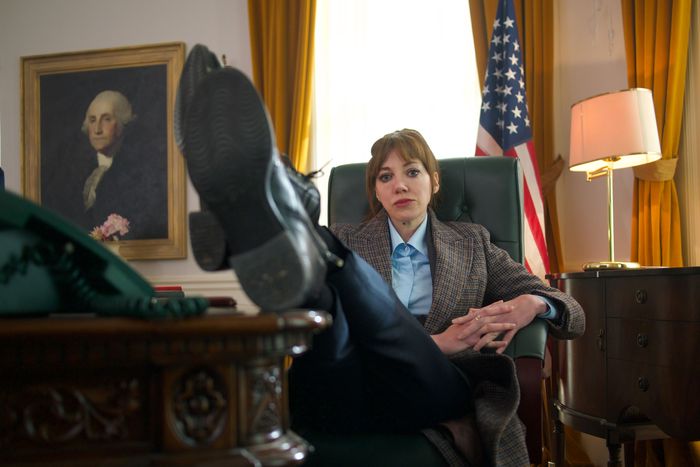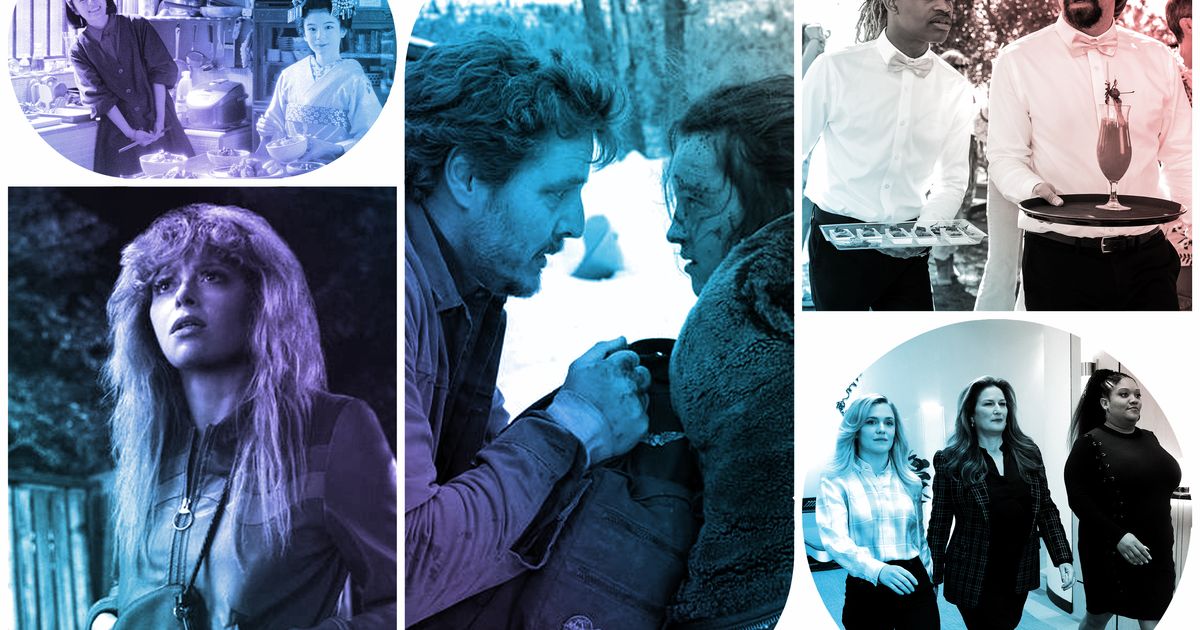
The Best TV Shows and Limited Series of 2023 (So Far)

Photo-Illustration: Vulture; Photos: HBO, NBC, Netflix, Peacock Starz
Surveying the TV landscape as 2023 enters season two (that would be spring), what becomes apparent is that no one type of show has a monopoly on quality. Sure, the first few months of the year may be most remembered for the splashy debut of an HBO series straight out of the Prestige TV playbook, but look beyond the Last of Us hype and there’s an unexpected medley of series that together reflect all the varied ways TV can satisfy and delight. A stylish, boldly episodic procedural mystery? Check. A previously solid workplace sitcom shifting into a higher gear? Check. A can’t-look-away deconstruction of reality-competition strategy? Check. A long-awaited revival that somehow manages to outshine the beloved original? We are, indeed, having fun yet. Only three months in, and this is already shaping up to be one of the more interesting TV years in recent memory.
All titles are listed by U.S. premiere date with the most recent series up top.
Matthew Rhys as Perry Mason.
Photo: Warner Brothers
In the first season, Perry Mason was a show full of good elements that couldn’t figure out how to organize them all into something that really worked. Season two is one of those sharp improvements in television that make you feel a little giddy. All the minor characters fit together now, and Perry Mason’s reticence about actually doing his job has been harnessed into a more interesting inner turmoil. And best of all, season two is just more fun. Perry Mason! He slouches around Los Angeles, glaring grimly at the city’s blithe sunny exterior, knowing that it conceals a rotten core of corruption and greed! Perry Mason! He wears tweeds and rides around on a little motorbike and carries a floppy leather briefcase full of evidence he may or may not have acquired legally! He hunches over lunch counters eating sandwiches; he yells at judges when he knows they’re being unfair; he can’t stomach injustice, and he loves a little bit of legal theater! His nemesis is named Ham Burger! What a delight. —Kathryn VanArendonk
Read Kathryn VanArendonk’s review of Perry Mason season two and Andy Andersen’s recaps of the season.
Martin Starr and Tyrel Jackson Williams in Party Down.
Photo: Colleen Hayes/Starz
Resurrecting a comedy 13 years after it was canceled because its first two seasons were so low-rated? Doesn’t exactly sound like the kind of gamble most cable networks want to take these days. Thank the gods of passed hors d’oeuvres that Starz did it anyway, because the third season of Party Down is as good, if not better, than the two that came before it. The vibe carried over from the Party Down of yore — in which young, creative L.A. types trudged their way through gigs at a catering company on their way to what they assumed would be more successful careers — has become even more tragic and comical in the present day, when the same people still find themselves stuck in the same hustle. It helps too that everyone in this murderer’s row of a comedy cast — Adam Scott, Ken Marino, Jane Lynch, Megan Mullally, Martin Starr, Ryan Hansen — has gotten even more skillful with age. (Ken Marino is a genius, and no, this is not hyperbole!) They’re also joined by equally talented actors in Jennifer Garner, Zoë Chao, and Tyrel Jackson Williams, who fit in seamlessly among this motley, bow-tied crew. In real life, it sucks to be dealing with the same dead-end job for more than a decade. On Party Down? It’s the best. —Jen Chaney
Read Kathryn VanArendonk’s review of Party Down season three, Erin Qualey’s recaps of the season, Jen Chaney’s profile of Ken Marino, and listen to Jesse David Fox’s Good One podcast interview with star Adam Scott and showrunner John Enbom.
Natasha Lyonne in Poker Face.
Photo: Peacock
All hail the new vanguard of the episodic mystery show, now brushed up and retrofitted for a streaming audience. Rian Johnson’s soft-pedal Columboreboot series, starring Natasha Lyonne as an unintentional detective who happens to have an infallible mental lie detector, was a bit of an experiment in the TV calendar this year. Would viewers embrace weekly episodic stories on a platform known for its binge releases and serial dramas? (Would viewers … subscribe to Peacock??) At least for the first question, the answer appears to have been a hopeful yes. Poker Face, which ended with two especially strong format-twisting episodes, has been renewed for a second season. (Jury’s still out on whether enough people are signing up for Peacock in order to watch it.) —K.V.A.
Read Kathryn VanArendonk’s review of Poker Face, VanArendonk’s interview with creator Rian Johnson, Roxana Hadadi’s essay about the role of police in the series, and Amanda Whiting’s recaps of the season.
Photo: Greg Gayne/NBC
The workplace sitcom has a long and storied history in American television, but in its second season, American Auto has proven itself to be a notable and satisfying new iteration of the genre. Set in the executive suite of a fictional Michigan car company, the show is at its best when it finds ways to skewer all the absurdities of American corporate culture. Often that plays out in fun, surreal ways: There’s a wildly silly episode about trying to select a company spokesman, and another where the CEO (played by an excellent Ana Gasteyer) gets talked into spending too much money on a Theranos-esque start-up. It’s a generally light show, but season two has also embraced more pointed story lines. In one of the standout episodes, several higher-level employees form a committee (all men) to write the company’s abortion policy — what will the company cover, what happens if employees need to travel to other states, how much leave they’ll get. It’s American Auto at its best. There are lovable, often well-intentioned characters, doing their best while also being total corporate nightmares. —K.V.A.
Read Devon Ivie’s interview with Ana Gasteyer on American Auto.
Pedro Pascal and Bella Ramsey in The Last of Us.
Photo: HBO
Yes, this is the series that led to Pedro Pascal’s official coronation as the Internet’s Hot Daddy, but that is not why you should watch. (Fine: It can be a why, just not the only why.) This adaptation of the revered video game, whose filmmaking nods heavily to its source material, may initially seem like yet another standard postapocalyptic saga, but series co-creators Neil Druckmann and Craig Mazin take great pains to invest in character as much as the plot points that comprise their journeys. The first season’s end product is a series that’s grippingly faithful to the original interactive tale but willing to take detours — see the brilliant third episode — that result in inspired television. And yes, co-leads Bella Ramsey and Pascal are wonderful together, so much that you can’t wait to reunite with them in the already promised season two. — J.C.
Read Jen Chaney’s review of The Last of Us, Roxana Hadadi’s essay on the show and American exceptionalism, Hadadi’s interview with co-creator Craig Mazin, and Keith Phipps’s recaps of the season.
Photo: Netflix
There’s a lot of TV about being nice out there — Parks and Recreation, Ted Lasso. But there’s something different about The Makanai: Cooking for the Maiko House, a feeling more tangible and meaningful than generalized kindness. Here is a show about generosity in all its forms: feeding someone you love, forgiving someone who wronged you, caring for someone who’s ill, accepting someone’s differences in perspective and attitude. The warmth generated by The Makanai isn’t just from the steaming bowls of Japanese comfort food that we see painstakingly prepared in each episode, but from the friendships and relationships that slowly unfurl over the course of the season. The Makanai follows two teen best friends who travel to Kyoto, Japan, to train to be geiko, or traditional performance artists; once they start their education, their paths diverge professionally, but their bond only grows tighter. Showrunner and director Hirokazu Kore-eda has helped craft a beautiful work that Netflix barely promoted, but that is probably more nourishing than most TV you’ll watch this year. —Roxana Hadadi
Read Roxana Hadadi’s review of The Makanai: Cooking for the Maiko House.
Photo: Peacock
Competitive reality TV has been in a monotonous state for a while, what with the glut of dating and dropped-in-wilderness programming following the same old narratives. It’s been a long time since a group-focused show took advantage of all the backstabbing and scheming this format can offer, and since a show debuted that had no established formula its competitors could take advantage of. Enter The Traitors, the American adaptation of a Dutch production. The Peacock streaming series mixed together reality-TV stars with regular people, some of whom would be selected by host Alan Cumming as “traitors” and others as the “faithful,” and the former had to sabotage the latter and the latter had to figure out the identities of the former. As always, money was on the line, and physical challenges along the way helped sharpen the team dynamics. The broad strokes of The Traitors are familiar to this genre, but what made for compelling TV was how truly awful most of these people were at reading each other, how easily the normies fell into their own (mostly negative) groupthink perceptions of the reality-TV stars around them, how diabolical some of the traitors were in their double crosses, and how the people who flourished in this setup (like the eventual winner, whose name we won’t reveal here for people who haven’t yet watched) really made it their own. One last bit of praise? The Traitors didn’t stick to revealing who went home at the end of the episode, instead moving around its reveals within each hourly installment. That choice kept viewers on their toes, too, making The Traitors immersive, entertaining viewing in nearly every way. —R.H.
Read Brian Moylan’s recaps of The Traitors.
Photo: BBC/Netflix
Philomena Cunk is the kind of comedic persona who feels as if she emerged from the sea fully formed, much like Botticelli’s Venus, a painting that Philomena Cunk herself does not understand. In Cunk on Earth, Diane Morgan plays the supremely airheaded and yet self-certain host of a history series, spending her time wandering across various landscapes in a long coat and badgering historians with some very stupid questions (for instance, why didn’t Beethoven add any lyrics to his “Fifth Symphony”?). The show walks a fine line between making fun of the kinds of documentaries high-school history teachers tend to put on when they don’t want to teach a class and lovingly matching the rhythms of those series. It all depends on Morgan, who brings an essential warmth to Cunk, making the character supremely ridiculous and yet totally endearing. You’ve gotta love someone who, in the middle of trying to recap all of human history, just can’t stop bringing up “Pump Up the Jam.” —Jackson McHenry
Read Hershal Pandya’s piece on the “perfect stupidity” of Cunk on Earth.

